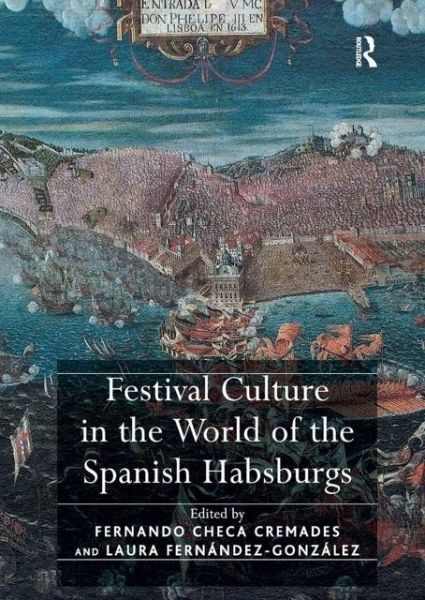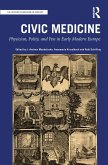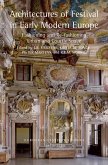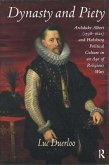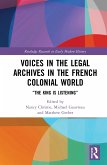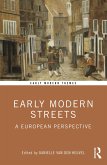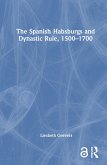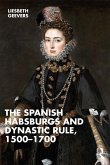Fernando Checa Cremades, Laura Fernandezâ Gonzalez
Festival Culture in the World of the Spanish Habsburgs
Fernando Checa Cremades, Laura Fernandezâ Gonzalez
Festival Culture in the World of the Spanish Habsburgs
- Broschiertes Buch
- Merkliste
- Auf die Merkliste
- Bewerten Bewerten
- Teilen
- Produkt teilen
- Produkterinnerung
- Produkterinnerung
Festivals and ceremonials played a major role in the Spanish world; through them local identities as well as a common Spanish culture made their presence manifest within and beyond the peninsula through ephemeral displays, music and print. This book explores Habsburg Visual culture at court and its connection with the creation of a language of triu
Andere Kunden interessierten sich auch für
![Civic Medicine Civic Medicine]() Civic Medicine66,99 €
Civic Medicine66,99 €![Architectures of Festival in Early Modern Europe Architectures of Festival in Early Modern Europe]() Architectures of Festival in Early Modern Europe55,99 €
Architectures of Festival in Early Modern Europe55,99 €![Dynasty and Piety Dynasty and Piety]() Luc DuerlooDynasty and Piety213,99 €
Luc DuerlooDynasty and Piety213,99 €![Voices in the Legal Archives in the French Colonial World Voices in the Legal Archives in the French Colonial World]() Voices in the Legal Archives in the French Colonial World66,99 €
Voices in the Legal Archives in the French Colonial World66,99 €![Early Modern Streets Early Modern Streets]() Early Modern Streets47,99 €
Early Modern Streets47,99 €![The Spanish Habsburgs and Dynastic Rule, 1500-1700 The Spanish Habsburgs and Dynastic Rule, 1500-1700]() Elisabeth GeeversThe Spanish Habsburgs and Dynastic Rule, 1500-1700123,99 €
Elisabeth GeeversThe Spanish Habsburgs and Dynastic Rule, 1500-1700123,99 €![The Spanish Habsburgs and Dynastic Rule, 1500-1700 The Spanish Habsburgs and Dynastic Rule, 1500-1700]() Elisabeth GeeversThe Spanish Habsburgs and Dynastic Rule, 1500-170033,99 €
Elisabeth GeeversThe Spanish Habsburgs and Dynastic Rule, 1500-170033,99 €-
-
-
Festivals and ceremonials played a major role in the Spanish world; through them local identities as well as a common Spanish culture made their presence manifest within and beyond the peninsula through ephemeral displays, music and print. This book explores Habsburg Visual culture at court and its connection with the creation of a language of triu
Hinweis: Dieser Artikel kann nur an eine deutsche Lieferadresse ausgeliefert werden.
Hinweis: Dieser Artikel kann nur an eine deutsche Lieferadresse ausgeliefert werden.
Produktdetails
- Produktdetails
- Verlag: Taylor & Francis Ltd
- Seitenzahl: 322
- Erscheinungstermin: 14. Oktober 2024
- Englisch
- Abmessung: 244mm x 177mm x 25mm
- Gewicht: 566g
- ISBN-13: 9781032922157
- ISBN-10: 103292215X
- Artikelnr.: 71581033
- Herstellerkennzeichnung
- Libri GmbH
- Europaallee 1
- 36244 Bad Hersfeld
- 06621 890
- Verlag: Taylor & Francis Ltd
- Seitenzahl: 322
- Erscheinungstermin: 14. Oktober 2024
- Englisch
- Abmessung: 244mm x 177mm x 25mm
- Gewicht: 566g
- ISBN-13: 9781032922157
- ISBN-10: 103292215X
- Artikelnr.: 71581033
- Herstellerkennzeichnung
- Libri GmbH
- Europaallee 1
- 36244 Bad Hersfeld
- 06621 890
Fernando Checa Cremades is a full Professor of History of Art at the University Complutense in Madrid and a former director of the Prado Museum in Madrid, Spain. Checa is recipient of the prestigious National Prize in History awarded by the Spanish Ministry of Culture for his ground-breaking study on Philip II of Spain as patron of the arts (Felipe II. Mecenas de las Artes). Fernando has published extensively on the artistic and cultural patronage of the Spanish House of Habsburg, especially during the rule of Emperor Charles V and Philip II of Spain. Checa is an active guest curator having curated major exhibitions on the royal collections of the Habsburgs and their extended family. Checa's most recent monograph explores Titian's production for the European courts (Tiziano y las Cortes del Renacimiento). Dr Laura Fernández-González is a Lecturer in the School of History & Heritage, College of Arts at the University of Lincoln. She has held post-doctoral fellowships at the Institute for Advance Research in the Humanities (University of Edinburgh) and the Calouste Gulbenkian Foundation in Lisbon (Portugal). Laura's research programme and publication record concern cultural exchange, the relationship between centres and peripheries, and how these tensions are reflected in the artistic and architectural production of the early modern Spanish and Portuguese global empires. Laura graduated with PhD from the University of Edinburgh in 2012, and her thesis was a recipient of a 'Dissertation award: Honourable mention' awarded by the Association of Spanish and Portuguese Historical Studies (ASPHS). She was convenor of the international conference on festivals of the Spanish Habsburgs in Edinburgh that was the origin of the present book.
Foreword, Teófilo F. Ruiz; Introduction. Part I Habsburg Visual Culture:
Tapestries, Paintings and Festivals at Court: The language of triumph:
images of war and victory in two early modern tapestry series, Fernando
Checa Cremades; The ceremonial decoration of the Alcázar in Madrid: the use
of tapestries and paintings in Habsburg festivities, Miguel A. Zalama
Rodríguez. Part II Entries, Sojourns and the Wider Triumphal Culture in the
Habsburg World: Festival interventions in the urban space of Habsburg
Madrid, David Sánchez Cano; Negotiating terms: King Philip I of Portugal
and the ceremonial entry of 1581 into Lisbon, Laura Fernández-González; The
loose parts of an entry: the flop of Cremona in 1598, Maria Ines Aliverti;
Margaret of Austria's travel in the state of Milan between 1598 and 1599,
Franca Varallo; Routes and triumphs of Habsburg power in colonial America,
Victor Mínguez Cornelles. Part III Religion and Empire: Processions,
Funerals and the Spanish Monarchy: The ceremonial king: kingly rituals and
imperial power in 17th-century New World cities, Alejandra B. Osorio;
Festivals and hagiography in the Spanish court (1565-1615), Juan Luis
González García; Corpus Christi in Spanish Palermo: two baroque apparati
by Giacomo Amato for the Duke of Uceda (Viceroy of Sicily, 1687-1696),
Sabina de Cavi. Part IV Music and Art in the Service of the Spanish
Habsburgs: Music in the service of the Spanish hegemony in early modern
Rome, Noel O'Regan; Royal festivals in mid-17th-century Naples: the image
of the Spanish Habsburg kings in the work of Italian and Spanish artists,
Ida Mauro. Bibliography; Index.
Tapestries, Paintings and Festivals at Court: The language of triumph:
images of war and victory in two early modern tapestry series, Fernando
Checa Cremades; The ceremonial decoration of the Alcázar in Madrid: the use
of tapestries and paintings in Habsburg festivities, Miguel A. Zalama
Rodríguez. Part II Entries, Sojourns and the Wider Triumphal Culture in the
Habsburg World: Festival interventions in the urban space of Habsburg
Madrid, David Sánchez Cano; Negotiating terms: King Philip I of Portugal
and the ceremonial entry of 1581 into Lisbon, Laura Fernández-González; The
loose parts of an entry: the flop of Cremona in 1598, Maria Ines Aliverti;
Margaret of Austria's travel in the state of Milan between 1598 and 1599,
Franca Varallo; Routes and triumphs of Habsburg power in colonial America,
Victor Mínguez Cornelles. Part III Religion and Empire: Processions,
Funerals and the Spanish Monarchy: The ceremonial king: kingly rituals and
imperial power in 17th-century New World cities, Alejandra B. Osorio;
Festivals and hagiography in the Spanish court (1565-1615), Juan Luis
González García; Corpus Christi in Spanish Palermo: two baroque apparati
by Giacomo Amato for the Duke of Uceda (Viceroy of Sicily, 1687-1696),
Sabina de Cavi. Part IV Music and Art in the Service of the Spanish
Habsburgs: Music in the service of the Spanish hegemony in early modern
Rome, Noel O'Regan; Royal festivals in mid-17th-century Naples: the image
of the Spanish Habsburg kings in the work of Italian and Spanish artists,
Ida Mauro. Bibliography; Index.
Foreword, Teófilo F. Ruiz; Introduction. Part I Habsburg Visual Culture:
Tapestries, Paintings and Festivals at Court: The language of triumph:
images of war and victory in two early modern tapestry series, Fernando
Checa Cremades; The ceremonial decoration of the Alcázar in Madrid: the use
of tapestries and paintings in Habsburg festivities, Miguel A. Zalama
Rodríguez. Part II Entries, Sojourns and the Wider Triumphal Culture in the
Habsburg World: Festival interventions in the urban space of Habsburg
Madrid, David Sánchez Cano; Negotiating terms: King Philip I of Portugal
and the ceremonial entry of 1581 into Lisbon, Laura Fernández-González; The
loose parts of an entry: the flop of Cremona in 1598, Maria Ines Aliverti;
Margaret of Austria's travel in the state of Milan between 1598 and 1599,
Franca Varallo; Routes and triumphs of Habsburg power in colonial America,
Victor Mínguez Cornelles. Part III Religion and Empire: Processions,
Funerals and the Spanish Monarchy: The ceremonial king: kingly rituals and
imperial power in 17th-century New World cities, Alejandra B. Osorio;
Festivals and hagiography in the Spanish court (1565-1615), Juan Luis
González García; Corpus Christi in Spanish Palermo: two baroque apparati
by Giacomo Amato for the Duke of Uceda (Viceroy of Sicily, 1687-1696),
Sabina de Cavi. Part IV Music and Art in the Service of the Spanish
Habsburgs: Music in the service of the Spanish hegemony in early modern
Rome, Noel O'Regan; Royal festivals in mid-17th-century Naples: the image
of the Spanish Habsburg kings in the work of Italian and Spanish artists,
Ida Mauro. Bibliography; Index.
Tapestries, Paintings and Festivals at Court: The language of triumph:
images of war and victory in two early modern tapestry series, Fernando
Checa Cremades; The ceremonial decoration of the Alcázar in Madrid: the use
of tapestries and paintings in Habsburg festivities, Miguel A. Zalama
Rodríguez. Part II Entries, Sojourns and the Wider Triumphal Culture in the
Habsburg World: Festival interventions in the urban space of Habsburg
Madrid, David Sánchez Cano; Negotiating terms: King Philip I of Portugal
and the ceremonial entry of 1581 into Lisbon, Laura Fernández-González; The
loose parts of an entry: the flop of Cremona in 1598, Maria Ines Aliverti;
Margaret of Austria's travel in the state of Milan between 1598 and 1599,
Franca Varallo; Routes and triumphs of Habsburg power in colonial America,
Victor Mínguez Cornelles. Part III Religion and Empire: Processions,
Funerals and the Spanish Monarchy: The ceremonial king: kingly rituals and
imperial power in 17th-century New World cities, Alejandra B. Osorio;
Festivals and hagiography in the Spanish court (1565-1615), Juan Luis
González García; Corpus Christi in Spanish Palermo: two baroque apparati
by Giacomo Amato for the Duke of Uceda (Viceroy of Sicily, 1687-1696),
Sabina de Cavi. Part IV Music and Art in the Service of the Spanish
Habsburgs: Music in the service of the Spanish hegemony in early modern
Rome, Noel O'Regan; Royal festivals in mid-17th-century Naples: the image
of the Spanish Habsburg kings in the work of Italian and Spanish artists,
Ida Mauro. Bibliography; Index.

